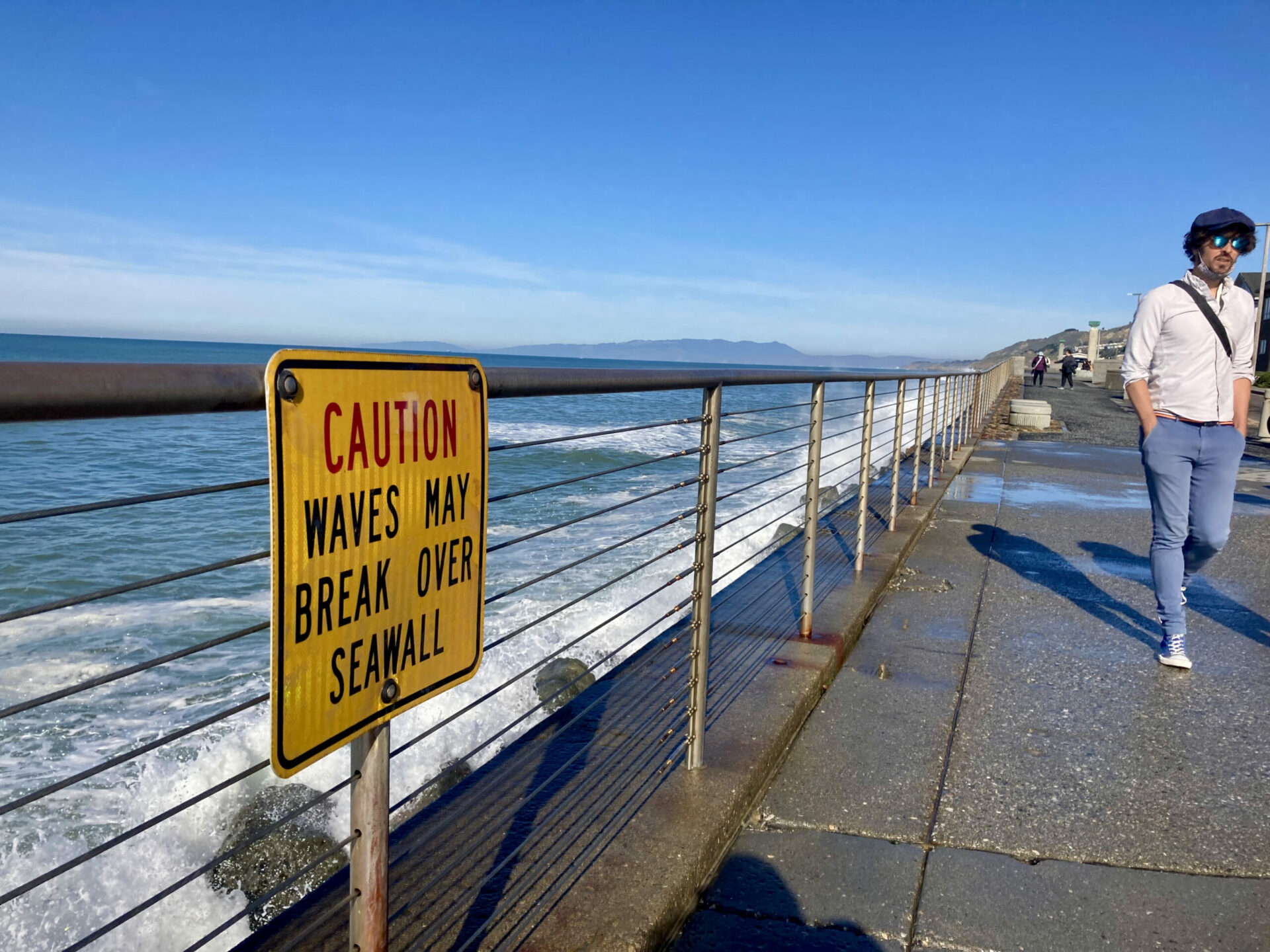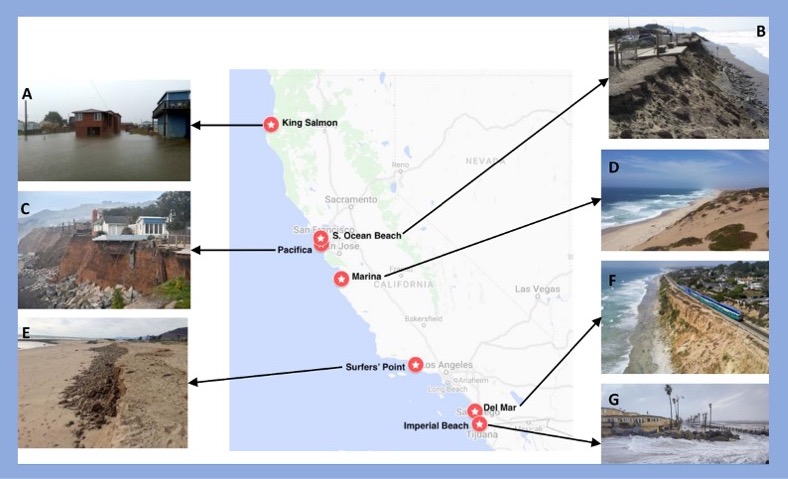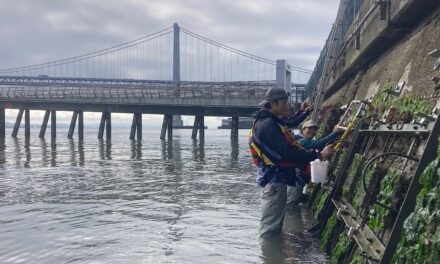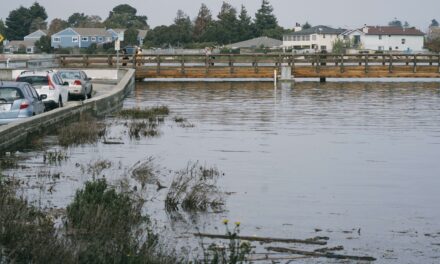Retreat By Any Other Name
To prepare for the ocean moving in, many waterfront structures will have to move out. But don’t call it “managed retreat.”
It’s one of many conclusions a group of scientists drew from a study of how seven Californian towns and cities tried to plan for rising seas, with wildly different results.
“Retreat can conjure failure, and nobody wants to be managed,” explained the study’s corresponding author Amanda Stoltz at the California Social Coast Forum this March. Part of the problem is the term itself. One Pacifica resident quoted in the study commented, “Managed retreat’ is a code word for give up — on our homes and the town itself.”
Managed retreat from sea level rise, or planning to move property and infrastructure to higher ground, elicited strong opposition from four of the communities Stoltz and her coauthors examined. But the practice was accepted, even embraced, in three others.
The seven locations where a team of scientists examined reactions to managed retreat planning. Source: Stoltz et al., 2021.
Affluence often aligns with stronger resistance to relocation. But an even stronger factor could be how much private versus public land is imperiled. In wealthy San Francisco, a lengthy process of negotiation triumphed with a plan for managed retreat of a beloved public beach, while residents of the remote northern town of King Salmon rallied against the suggestion of relocating from their homes. Nearly three-quarters of the town qualifies as “economically disadvantaged” by federal criteria.
Acceptance of managed retreat also hinged on how early in the planning process community members were consulted. Consistent communication reaped fruitful agreements in places like Marina in Monterey County, but fell through in Imperial Beach near San Diego, where fearful, conspiracy-tinged messaging infected the discourse faster than local officials could get ahead of it.
The importance of language choice cropped up in almost every location. One conservative retreat-resistant town had residents who didn’t approve of the term “sea-level rise,” although they acknowledged that flooding had grown vastly more common over time. In Del Mar, a wealthy seaside enclave with a renowned racetrack, the term “managed retreat” was scrubbed from the policy docket after vociferous public opposition — yet part of their adaptation plan states, with no apparent trace of irony, that they will monitor flooding frequency to determine whether it “is becoming unsustainable to rebuild in the same location.”
Since the study was published, Stoltz has noticed more chatter about managed retreat (or ‘graceful withdrawal,’ as she suggests calling it.) A recent bill supporting revolving loan funds for municipalities to buy threatened properties died on the governor’s desk, with Newsom insisting on a more integrated state-level approach to the issue. Regardless of how sea-level rise policy progresses, Stoltz hopes that planners will take note of their neighbors’ early successes and failures as more municipalities confront what to do about the half-million California homes in the path of the rising sea.
“You can’t just go in with solutions and think that they’re going to be accepted,” she says. “Even if the science is really strong.”
Other Recent Posts
Slow Progress on Shade For California’s Hottest Desert Towns
Coachella Valley communities face record temperatures with little shade. Policy changes lag as local groups push for heat equity.
In Uncertain Times, the Port of Oakland Goes Electric
A $322M grant powers Oakland’s port electrification — cleaning air, cutting emissions, and investing in community justice.
Testing Adaptation Limits: Mariposa Trails, Marin Roads & San Francisco Greenspace
In KneeDeep’s new column, The Practice, we daylight how designers, engineers and planners are helping communities adapt to a changing climate.
ReaderBoard
Once a month we share reader announcements: jobs, events, reports, and more.
Boxes of Mud Could Tell a Hopeful Sediment Story
Scientists are testing whether dredged sediment placed in nearby shallows can help our wetlands keep pace with rising seas. Tiny tracers may reveal the answer.
“I Invite Everyone To Be a Scientist”
Plant tissue culture can help endangered species adapt to climate change. Amateur plant biologist Jasmine Neal’s community lab could make this tech more accessible.
How To Explain Extreme Weather Without the Fear Factor
Fear-based messaging about extreme weather can backfire. Here are some simple metaphors to explain climate change.
Live Near a Tiny Library? Join Our Citizen Marketing Campaign
KneeDeep asks readers to place paper zines in tiny street libraries to help us reach new folks.
Join KneeDeep Times for Lightning Talks with 8 Local Reporters at SF Climate Week
Lightning Talks with 8 Reporters for SF Climate Week
Staying Wise About Fire – 5 Years Post-CZU
As insurance companies pull out and wildfire seasons intensify, Santa Cruz County residents navigate the complexities of staying fire-ready.











